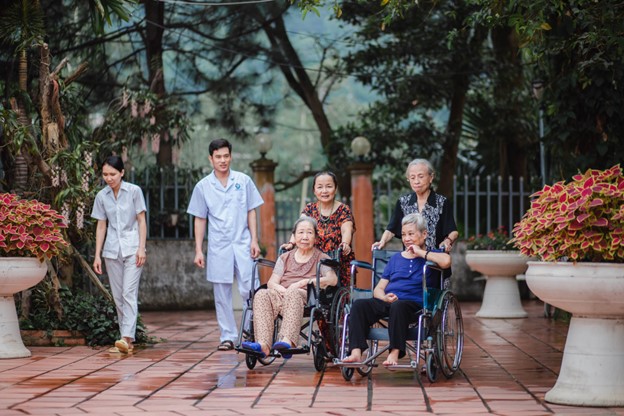Việt Nam's nursing home real estate has bright future: Association
According to the report on "Population aging and older persons in Việt Nam" by the General Statistics Office, Việt Nam is one of the countries with the fastest population aging rate in the world
 |
|
Many older persons choose nursing homes to get better health care. That is expected to promote the development of the nursing home property market. — Photo nhadautu.vn |
HÀ NỘI — Việt Nam's nursing home real estate market promises strong growth in the future because the aging rate is increasing while this housing segment is not yet attractive to investors, according to the Vietnam Association of Realtors (VARs).
VARs said according to the report on "Population aging and older persons in Việt Nam" conducted by the General Statistics Office, Việt Nam is one of the countries with the fastest population aging rate in the world.
It is forecast that the number of older persons (those aged 60 and above) will reach 17.28 million, accounting for 16.5 per cent of the total population, by 2029; 22.29 million (accounting for 20.21 per cent) by 2038; and 28.61 million people (27.11 per cent) by 2069.
The statistics also show that the Red River Delta, North Central Coast and Central Coast are regions with the highest proportion of older persons, including Hà Nội, Thái Bình, Thanh Hoá and Nghệ An. Meanwhile, in the southern region, HCM City and Đồng Nai have 841,005 older persons and 278,159 older persons, respectively.
The report said older persons now live more independently with their children. The proportion of older persons not living with their children surged from 9.68 per cent in 2009 to 13.74 per cent in 2019 and this rate increased in both urban and rural areas.
The proportion of older people living with only one spouse also increased from 8.69 per cent in 2009 to 14.09 per cent in 2019 and this growth happened in both urban and rural areas.
Older persons often face difficulties in daily activities and troubles in health.
At present, people's views on nursing homes have changed. Sending parents to a nursing home does not mean that their children do not love their parents. Meanwhile, parents now also very much want to live in a community with old friends, and doctors and nurses to monitor their daily health.
Thus, the need for long-term care of the elderly will increase in the coming years, according to the association.
However, a survey and statistics by Bảo Việt Insurance Company (BVI) reported that Việt Nam had about 80 private care facilities targeting the elderly in 2021. Meanwhile, only 32 out of 63 provinces and cities nationwide have nursing homes for older persons and those are mostly invested by the private sector.
Developing nursing home properties is an effective solution for these challenges and also opens up many other social and economic development opportunities, according to VARs research.
Private nursing home properties providing facilities and services following the trend of "luxury resorts" for older persons also have great potential for development together with the increasing annual growth rate of the middle class in Việt Nam, it said.
According to a report by the Ministry of Labour, Invalids and Social Affairs, the emerging middle-class now accounts for 13 per cent of the population and is expected to grow to 26 per cent by 2026. Therefore, nursing home facilities are expected to attract middle-class persons, the research said.
Many large corporations and businesses see the potential of nursing home properties and have begun the development of this property segment, especially luxury nursing homes. However, according to VARs, this segment has not yet received enough attention.
VARs also commented that according to the GSO survey, older persons are likely to move to the countryside. With this trend, project developers can develop the nursing real estate segment on the outskirts of big cities.
The infrastructure is being invested and completed in a synchronous manner, so moving to these areas will no longer be an obstacle, said VARs chairman Nguyễn Văn Đính.
In addition, Việt Nam has many competitive advantages such as natural landscape, culture and cost. Strong development of this segment will attract a large number of overseas Vietnamese from more than 5.3 million overseas Vietnamese returning to their hometowns to recuperate in old age, Đính said.
Experts say that the nursing service industry in Việt Nam is definitely an investment field that must be developed due to increased market demand.
To encourage the development of nursing home properties, Việt Nam will need to add more regulations in this field according to the real situation. The most important is still the vision of policymakers, in the context that Việt Nam's population will age faster in the future.
The Government has set a target of having at least one nursing home in each province and city by 2025.








